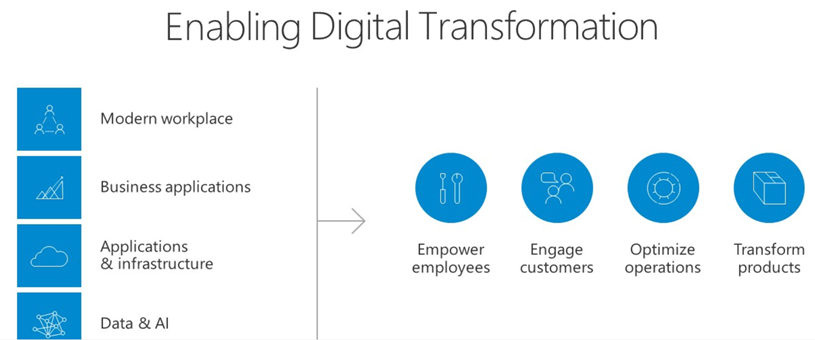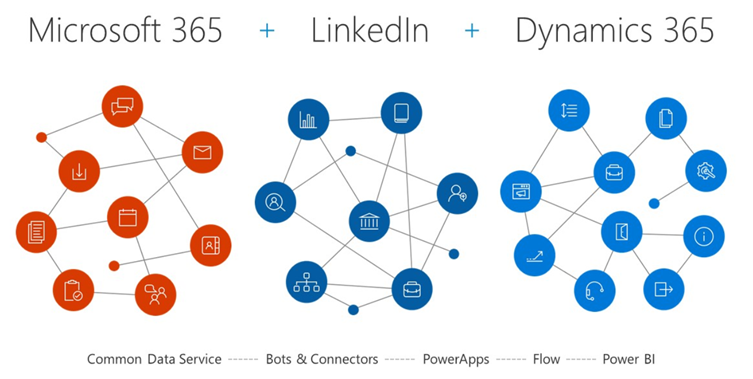Satya Nadella on Digital Transformation (2018)
Note: This article is updated at Satya Nadella on Digital Transformation 2018.
“With you, we seek to unlock the unimaginable, and to solve the impossible.” – Satya Nadella
Satya Nadella shared his take on how Microsoft can enable digital transformation at Ignite:
Satya Nadella at Ignite: “We collectively have the opportunity to lead in this transformation”
Here is Satya’s mental model for framing how Microsoft is enabling digital transformation for the world:
4 Digital Transformation Pillars
Satya identifies four digital transformation pillars:
- Empower employees
- Engage customers
- Optimize operations
- Transform products
4 Solution Areas
Satya identifies four Solution Areas:
- Modern workplace
- Business applications
- Applications and infrastructure
- Data and AI.
Satya says:
“These systems of intelligence and how we bring about the technology, how we bring about this cultural shift, is what Microsoft is focused on, with four core ingredients. We call them solution areas: modern workplace, business applications, applications and infrastructure, and data and AI.”
Modern Workplace
The goal of modern workplace is to unleash the creativity that’s in all of us through new models of empowerment and new ways of working.
Satya says:
“Together, we are building a modern workplace, which starts with empowering everyone in an organization to be more creative and collaborative, and ultimately apply technology to help shape the culture of work. And importantly, secure your organization’s digital estate. It’s this cultural shift that’s top of mind for every leader and every organization, and that’s what we want to enable with Microsoft 365.
We aim to unlock the creativity in all of us, so that you can bring out the best in everyone in your organization.”
Business Applications
Business apps are evolving from monolithic suites to modern, modular apps with a common data model.
Satya says:
“Every business process is being digitized, from relationship sales, talent and people processes, operations, customer service, field service and more. For this evolution to be successful, we must move from monolithic suites and disconnected data silos to modern, modular apps with a common data model.
You need a platform approach.
One way this is coming together is in the combination of business applications, mixed reality and IoT.
Microsoft is infusing AI into our business applications to transform customer care and equip customer support agents with intelligence to best serve their customers’ needs.”
Applications & Infrastructure
Apps and infrastructure help empower people and organizations to build apps into the core of their business.
Satya says:
”Applications and infrastructure, data and AI are the solution areas that enable our partners and customers to build specialized apps into the core of business, AI- and MR-first apps and solutions in this era of the intelligent edge and the intelligent cloud.
Azure is the platform that brings these solutions to life. It is one fabric that is truly distributed and supports hybrid computing.”
Data & AI
Reasoning over existing data combined with AI can empower new levels of insight and automation.
Satya says:
“Data is driving this change, but what if we started with the data we already have and started reasoning over it to create new levels of automation?
Microsoft is infusing AI into our business applications to transform customer care and equip customer support agents with intelligence to best serve their customers’ needs.”
The cloud fueling AI is helping partners and customers like Tetra Pak, Land O’ Lakes, Epic, Trimble and the University of Washington, and Addenbrooke’s Hospital transform and build systems of intelligence, to build their own AI.”
Ford's Modern Workplace
Ford is a living example of a modern workplace evolving to empower people to do their jobs better, faster, and easier.
Satya says:
“Ford, for example, is not only breaking down organizational boundaries, but is simultaneously breaking down geographical boundaries as well by using the power of mixed reality to brainstorm, design and develop new vehicles.
This represents a sea change at Ford. In the past, designing a new car involved building a clay model that weighed 5,000 pounds. This required moving it around in order for people to see it. But what if you could create a digital feedback loop where everyone is collaborating simultaneously? That’s the kind of innovation we’re unlocking with the modern workplace. And when you add mixed reality, the very nature of collaboration changes.”
Mining Example of Business Apps + Mixed Reality + IoT
Satya shares an example of how the mining industry is driving digital transformation:
“One way this is coming together is in the combination of business applications, mixed reality and IoT.
Consider mining as an example of how the role of business applications is fundamentally transforming an industry. Mining has complex engineering requirements, stringent health and safety policies, and very significant up-front capital expenses. To stay competitive, mining companies have invested in technologies like AI, sensors and geospatial analytics to digitize their operations and become true data-driven businesses.
But the connected mining operation is taking transformation one step farther by using Microsoft Teams, Microsoft HoloLens, Dynamics 365 and Azure to bring everyone together, from management to the geologist to help people succeed in ways never before possible.
These innovations can be applied to any business and across industries when data, software and mixed reality come together to drive digital transformation.”
Connected Graph: LinkedIn Graph + Microsoft Graph + Dynamics 365
Here is a visual that represents a constellation of some of Microsoft’s most strategic data assets: Microsoft Graph + LinkedIn Graph + Dynamics 365 Graph.
Satya says:
“Microsoft is transforming the data and intelligence that powers the modern workplace, and the Microsoft graph is perhaps one of the most important data assets — core to thinking about how customers unlock value.
Today, we’re announcing the first phase of integration between the LinkedIn graph and the Microsoft graph. With this rich platform and rich data graph you can start building AI-first applications. You can bring the power of AI, the power of natural language, the power of deep learning to the enterprise and unlock it.
Now, adding Dynamics 365 to this connected graph, we have an opportunity to redefine what customers can expect from their business applications.”
The New Era of Intelligent Cloud and the Intelligent Edge
Our worldview is evolving from a mobile-first, cloud-first world to the intelligent cloud and the intelligent edge.
Satya says:
"While our mission remains constant, technology paradigms come and go. Where before we held a worldview of a mobile-first, cloud-first world, that worldview is evolving to the new technology paradigm of the intelligent cloud and the intelligent edge."
According to Satya, there are three characteristics define this shift:
- The move to multi-device, multi-sensory interactions
- Artificial intelligence driving predictive insights across devices
- A new fabric of server-less, or distributed, computing power.
Systems of Intelligence
To succeed and lead in this new era of intelligent cloud and the intelligence edge, Microsoft is focused on building systems of intelligence:
Satya says:
“In this new era, Microsoft is building systems of intelligence, virtuous cycles and new feedback loops that help create data and refine how you reason over this data to gain insights from information.”
Intelligent, Personal, and Contextual Experiences
Modern experiences are intelligent, personal, and contextual.
Satya says:
“As we aim to empower people within an organization, Microsoft is taking it a step further, to ensure we’re also transforming the processes and functions surrounding them. Bing for Business combines data from the enterprise with public Web results to produce a seamless experience that’s intelligent, personal and contextual.”
You Might Also Like
All Digital Transformation Articles Digital Transformation Defined Digital Transformation Explained Digital Transformation Books Satya Nadella on Digital Transformation

